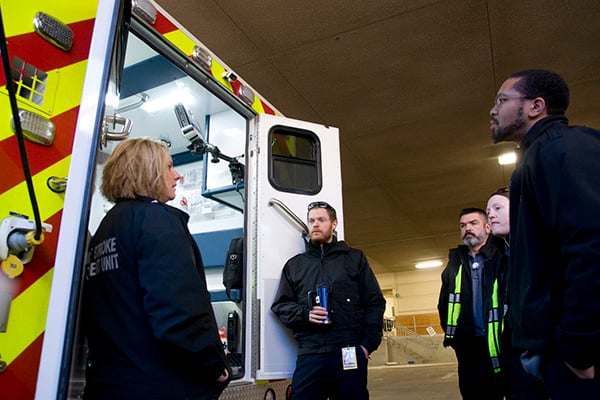The phone rang as Kim Nicholson was preparing to leave the office one night in late July. After a moment’s hesitation, she turned back to answer it.
The caller had an unusual offer, said Nicholson, annual giving officer for University of Colorado Hospital Foundation. He had a 2001 Infiniti SUV that he was replacing with a newer model. He wanted to donate it. Could University of Colorado Hospital find a use for it?
Ordinarily a car doesn’t come near the top of the hospital’s donation wish list. But in this case the timing was right. Coincidentally, Nicholson had gotten a request several months earlier from Brandi Schimpf, RN, manager of the Mobile Stroke Program at UCH, for help finding a vehicle that could be used to transport providers shuttling UCHealth’s Mobile Stroke Treatment Unit (MSTU) between Aurora and Colorado Springs.

The MSTU spends alternate weeks at UCH and Memorial Hospital in Colorado Springs. Schimpf wanted an extra vehicle that a provider could use to return to home base after dropping off the unit at the hospital using it on a given week. That would eliminate the need for a second staffer to accompany the unit in his or her private vehicle to provide transportation back after the drop-off, Schimpf said.
At the time Schimpf originally contacted her, Nicholson wasn’t hopeful she could meet the need. “I thought, ‘How are we going to find a car for donation?’” she recalled. Now, several months later, she was on the line with someone offering an answer out of the blue.
“When he called, it was fabulous,” Nicholson said.
A car for care
The surprise donor was Kelly Schneiderman, a Denver-area man who works with a medical device company. He hadn’t been a patient at UCH, nor had he made a previous donation, but he had a strong connection to the hospital.
Schneiderman’s father, Steve, was diagnosed with stage 4 lung cancer and began chemotherapy treatment at the University of Colorado Cancer Center with medical oncologist Ross Camidge, MD, in 2008. Camidge later enrolled him in a clinical trial of Tarceva, which was later approved as an oral targeted therapy for non-small cell lung cancer. Steve showed improvement for about a year, Kelly said, but then the drug stopped working. He resumed chemotherapy, but went downhill.
Steve was in home hospice, but Kelly and his family had trouble accepting that he had reached the end of the treatment road. They called Camidge and asked if there was a chance of putting Steve back on the Tarceva to stabilize him. Camidge responded with a house call, personally delivering the difficult news that resuming Tarceva might buy Steve a few more months, but would not restore his quality of life.
It was “a seminal moment,” that demonstrated Camidge’s honesty and compassion, Kelly said. “He had that personal connection and that, to me, was what solidified the relationship we had with the hospital.”

Steve passed away shortly thereafter in 2011, a few months after his 60th birthday. Kelly said he thought for a time about holding a fundraiser to give back to the hospital for the care Steve received, but time slipped away and that didn’t happen.
Brandi Schimpf (far left) during a briefing for a simulated run of the Mobile Stroke Treatment Unit last December.
Roads intersect
His decision last March to replace the Infiniti SUV that Steve had originally owned rekindled the donation idea. He initially contacted the Lung Cancer Program, which didn’t have a use for a car. Ultimately, though, his desire to donate and the Mobile Stroke Program’s need for a vehicle fortuitously crossed paths.
Schimpf helped complete the steps necessary to finalize the donation, including clearing it with Risk Management and arranging for insurance. Kelly took the vehicle to Infiniti of Denver, the dealership that has serviced it for its entire 15-year life, for an inspection and tune-up. The dealer handled that gratis and also donated a new battery.
Late last month Kelly joined Nicholson, Schimpf and Mobile Stroke Program Medical Director William Jones, MD, at the Infiniti of Denver dealership to finalize the donation. Schimpf and Jones explained the Mobile Stroke Treatment Program to him in further detail and how his donated vehicle will help the providers who get lifesaving help to stroke patients in the field.
It’s got 180,000 miles on it, but should be ready to help the stroke response team. “It’s an old car, but it still runs great,” Kelly said.
“We’re grateful to Kelly for thinking about the hospital as a donation site,” Schimpf said. “It was a blessing on the timing. I threw a wish out there and got a donated vehicle.”
